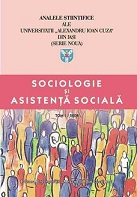Trust in Institutions and Political Engagement Among Students: a Quantitative Research
Trust in Institutions and Political Engagement Among Students: a Quantitative Research
Author(s): Vasiliu Roxana-MihaelaContributor(s): Daniela Tatiana Şoitu (Editor), Lucian Sfetcu (Editor)
Subject(s): Social Sciences, Sociology, Identity of Collectives
Published by: Editura Universităţii »Alexandru Ioan Cuza« din Iaşi
Keywords: political culture; public institutions; voting; democracy; civic and political engagement;
Summary/Abstract: Establishing a relation based on trust between citizens and institutions leads to agood functioning of society and a legitimation of the political system. According toprevious research (IRES, 2010, 2012, 2016, IMAS, 2011), Romanians– particularlyyouth, show low confidence in institutions, especially in politics. Why does thisgenerate negative effects? If citizens have confidence in institutions, they can givea meaning to their civic and political involvement. When level of trust tends to benegative, the motivations to engage in civic or political actions will decrease basedon the presumption that even if change is desired, the institutions will not allow itto happen. Thus, the paper aims to analyse the degree of students’ trust in publicinstitutions and their civic/ political behaviour, in the context in which theseindicators can influence – on medium and long term -, the type of political cultureand the relationship between government and citizens. The study is based on aquantitative research conducted between December 2019 – January 2020 amongstudents from three specializations within the Faculty of Philosophy and Social-Political Sciences, „Alexandru Ioan Cuza” University of Iasi, Romania on a sampleof 433 subjects, and had as main directions of analysis: the level of trust in publicinstitutions, the forms of civic/ political involvement practiced by students, theability to effect changes at high level. The results bring into attention that youthhave limited trust in institutions and this fact can justify an apathy condition andinsecurity regarding social and political change. At the same time, most students areunsatisfied by the Romanian democracy regime. The most common forms of civicand political involvement over the last year have been voting, signing petitions andparticipating in volunteer oriented work.
- Issue Year: 13/2020
- Issue No: 1
- Page Range: 139-150
- Page Count: 12
- Language: English

